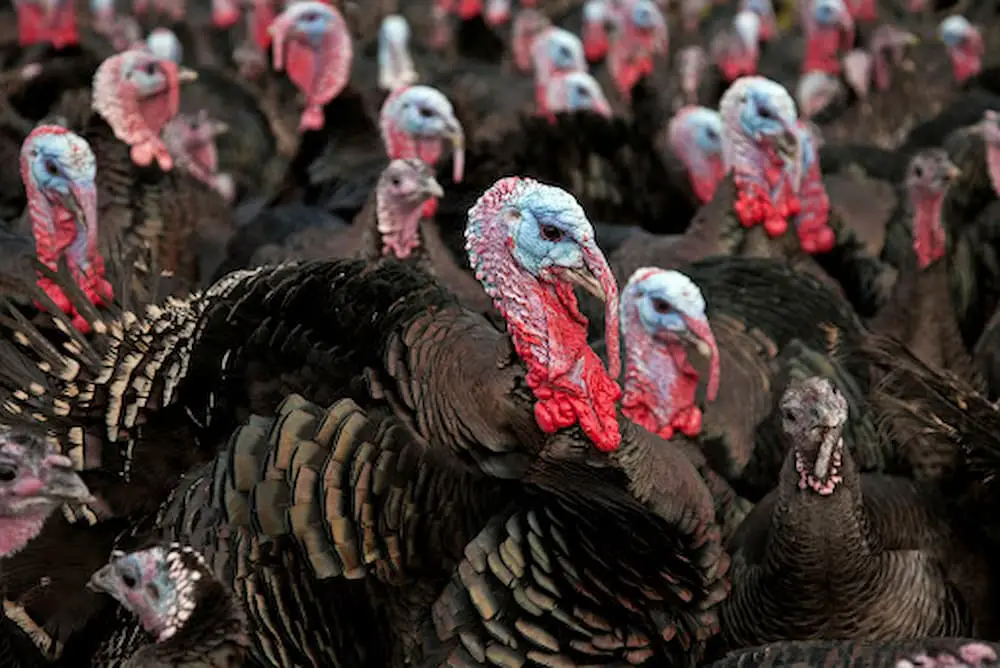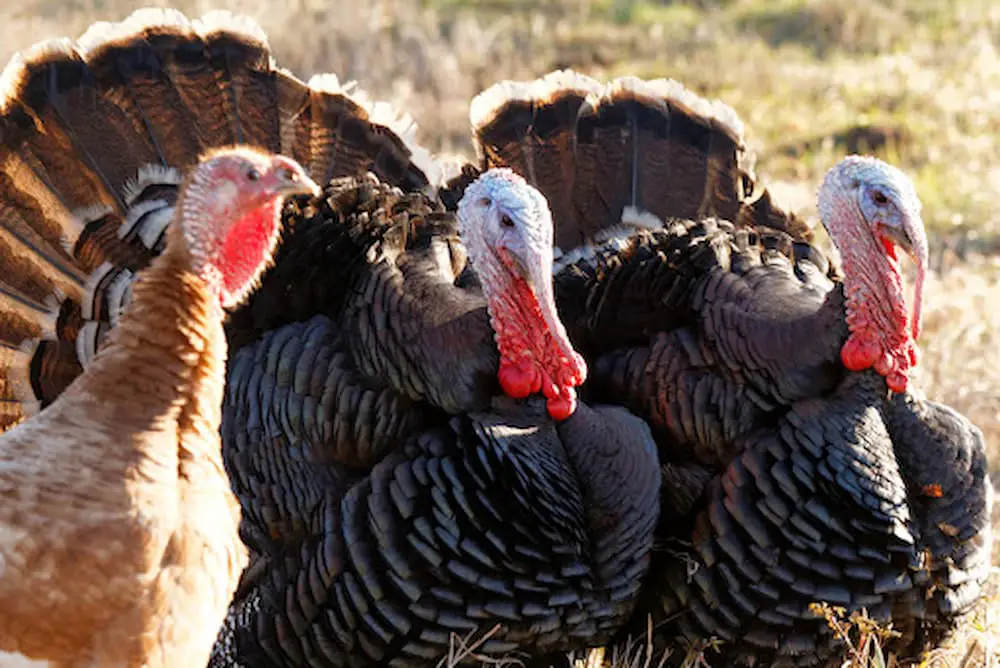Have you ever considered farming? It might not be as out of reach as you think.
Turkey farming is an integral part of the agricultural industry, but it’s also a great hobby. Free-range turkey farming, in particular, can be both rewarding and fun.
Curious about free-range turkey farming and how to get started? Consider this your comprehensive guide to free-range turkey farming. We explain turkey farming, why you should consider free-range turkey farming, and how to start your farm.
What Is Free Range Turkey Farming?
Turkey farming involves raising domesticated turkeys (not wild turkeys!) as either pets or livestock.
Learn how to raise your own quail and have an unlimited supply of eggs and meat.
While chickens are more commonly chosen to raise on farms due to the number of eggs they lay, turkeys are also a great choice. There are several different breeds of turkeys that you can raise, including:
- Black turkeys
- Midget White turkey breeds
- Bourbon Reds
- Jersey Buff
Free-range turkey farming is a type of farming where, instead of keeping your turkeys in a cage, you let them roam free in a confined area that protects them from predators. In general, free-range turkey farming is the better choice.
Why Choose Free Range Turkey Farming?
Free-range poultry typically tastes better and even contains more protein since turkeys are in better breeding conditions when in a free-range environment, as they can exercise, making them overall healthier.

Even if you aren’t raising your turkey as livestock, it’s better to allow it to roam free rather than have it cooped up in a cage all day.
Why Choose Turkey Farming?
There are many different benefits to free-range turkey farming. Some of the top reasons to consider starting a turkey farm include the following:
- Turkeys can make great pets. They’re docile and loving and also like to play. Plus, children love them!
- Although turkeys don’t lay a lot of eggs, their eggs are pretty big and delicious.
- Turkeys are a great first animal if you’re considering farming multiple animals in the future.
- If you raise turkey for consumption, you’ll always know where your food comes from and help with environmental problems.
Ready to start your turkey farming journey? Let’s walk through the steps.

How to Start Free Range Turkey Farming
Ready to learn how to start your own turkey farm? With a bit of planning, this is a feasible endeavor that you’ll find rewarding in the end.
The simple steps to starting your own turkey farm are as follows:
- Understand your state regulations for turkey farming.
- Find space for your turkeys.
- Make sure you have an enclosure to keep your turkeys safe.
- Purchase your turkeys.
- Ensure that you have enough suitable feed for your turkeys.
However, there are certain things that you should keep in mind while planning your free-range turkey farm. To help you out, here are essential tips for free-range turkey farming.
How Many Turkeys?
Turkeys are social animals. If you buy just one turkey, it will quickly get lonely, which may affect its health. Therefore, make sure that you commit to at least two turkeys.
Keeping that in mind, you must also ensure that you have space for at least two turkeys and that they are housed only with other turkeys or animals like them (more on this later).
Make Sure You Have Enough Space
Since turkeys are large birds, they require a lot of space. The space factor is even more critical for free-range farming, where the turkeys need room to roam.
Here’s a guide to how much space you should calculate each turkey needs from birth until full maturity:
- 0-8 weeks: 2-2.5 square feet per turkey
- 8-16 weeks: 3-4 square feet per turkey
- 16-20 weeks: 5-8 square feet per turkey
- 20 weeks onwards: 6-10 square feet per turkey
Multiply the square feet by the number of turkeys you plan on keeping. To be safe, you should aim to have additional room. Plus, if you anticipate your turkeys having chicks and want to be proactive, you should also plan for more space.
Giving turkeys enough space avoids boredom, lack of exercise, and resource competition. As a rule of thumb, giving your turkeys more space is better than not enough.
Keep Your Turkeys in the Right Environment
In keeping in mind how much space turkeys need, you want to ensure that you are keeping them in the right type of space, especially if you plan on keeping them indoors. Particularly, if you live somewhere with cold winters, you’ll want to ensure that you have an indoor space for your turkeys that’s large enough to run around.
You may very well need to keep your turkeys in a coop. In fact, it’s usually safer to keep your turkeys in a coop to protect them from the weather and shield them from unwanted predators who may harm them. It also provides them with somewhere safe and comfortable to roost.
It’s important to note that while certain heritage breeds may be resistant to spending their time in a coop, most other common breeds eventually get used to the coop life, so don’t give up if you’re met with some resistance from your turkeys at first.
Remember, your turkeys must spend their first six weeks of life in a brooder to keep warm before moving to a coop.
A traditional coop may not be enough if you plan on having many turkeys. You may need to build a barn, but make sure that there is plenty of ventilation.
Feed Your Turkeys Right
You must feed your turkeys a nutritionally balanced diet to ensure optimal growth. The food you should consider providing your turkey includes:
- Wheat
- Barley
- Canola
Even though turkeys are vegetarian, you may also want to incorporate a small percentage of animal protein in the form of meat or bone meal to ensure a proper protein intake.
The most economical way to feed your turkeys is by purchasing nutritious feed that already contains all the foods your turkeys need. Turkey feed is generally inexpensive and fortified with essential vitamins and nutrients for your turkeys.
You should give your turkeys access to their feed 24 hours a day to help themselves as they please.
Understand the Life Cycle of a Turkey
Knowing the life cycle of a turkey is essential in raising turkeys, as you’ll need to adjust your turkey feed accordingly.
It takes about 28 days for turkey poults to hatch. From there, it takes about 14 weeks for them to reach maturity.
If you’re raising turkeys for eggs, you’ll be waiting a while, as turkeys only begin to lay eggs around seven months. Moreover, they generally don’t lay many eggs, typically only two to three per week.
Know How Turkeys Mate
The mating habits of wild and domesticated turkeys differ because domesticated turkeys are much larger than wild turkeys, particularly having larger breasts. Their size makes it difficult for them to mate, as they can easily crush their mating partner.
Instead, it’s more common for breeders to use artificial insemination for breeding their turkeys. The ability to artificially inseminate turkeys is not only efficient, but it also minimizes potential turkey injuries through natural reproduction.
Here’s how artificial insemination works in simple terms: semen from a male turkey is collected, put into a syringe, and injected into the hens as soon as possible.
Here’s another interesting fact: Turkeys are capable of parthenogenesis, meaning that occasionally, the eggs of female turkeys may develop into embryos then baby turkeys without any sperm. Although this doesn’t happen often, and few embryos survive to become baby turkeys, it’s always possible!

What Animals Can You Keep With Turkeys?
As mentioned, turkeys are social animals and prefer to be with other turkeys. The best environment to keep your turkeys in is with other turkeys only.
That said, turkeys may be able to cohabitate with other animals, depending on the turkey species. It’s essential to remember that turkeys are popular prey animals, so you must pay particular attention to who you keep them with and where you keep them. You don’t want your turkeys to be accessible to predators such as weasels and raccoons, who can fit through small crevices, dig holes, and even sometimes open latches.
For best results, you should house your turkeys with animals of similar size and with similar predators. These animals could include:
- Chickens
- Ducks
- Geese
Avoid housing your turkeys with large mammals such as cattle or pigs, which have much different living arrangement requirements that may lead to quick access for predators.
How Much Turkey Does a Family Need?
If your goal of free-range turkey farming is for meat, it’s essential to understand the amount of turkey one family may need, especially around Thanksgiving.
Since turkeys come in various sizes, it’s best to measure the amount of turkey needed by the pound. For example, a small immediate family gathering may be okay with a small turkey that weighs four to six pounds. In contrast, a large gathering of 20 people should opt for a larger turkey closer to 30 pounds.
Since 18 to 20-pound turkeys are the most common and are most likely what you would be producing, it’s best to plan for one 20-pound turkey per dozen people.
Other Tips for Free Range Turkey Farming
Here are a few extra tips for free-range turkey farming.
- While turkey eggs are delicious, they aren’t super profitable. If you’re after profit, you’re better off fertilizing the eggs to get more turkeys rather than selling them.
- Even though turkeys are docile and friendly, they are high maintenance if you plan to keep them as a pet. They grow quickly, and you must closely monitor their diets.
- Avoid giving your turkeys table scraps or any other food that isn’t specifically from their feed.
- If you plan on selling your turkeys, double-check your state regulations to know what you can and cannot do.
Wrap-Up: The Rewards of Free Range Turkey Farming
Being a turkey farmer can be fun, profitable, and rewarding.
Although it takes a lot of work to start up, and you have to keep a close eye on your turkeys, you’ll find that turkey farming may become your favorite hobby, and you might even look forward to hanging out with your turkeys every day!

